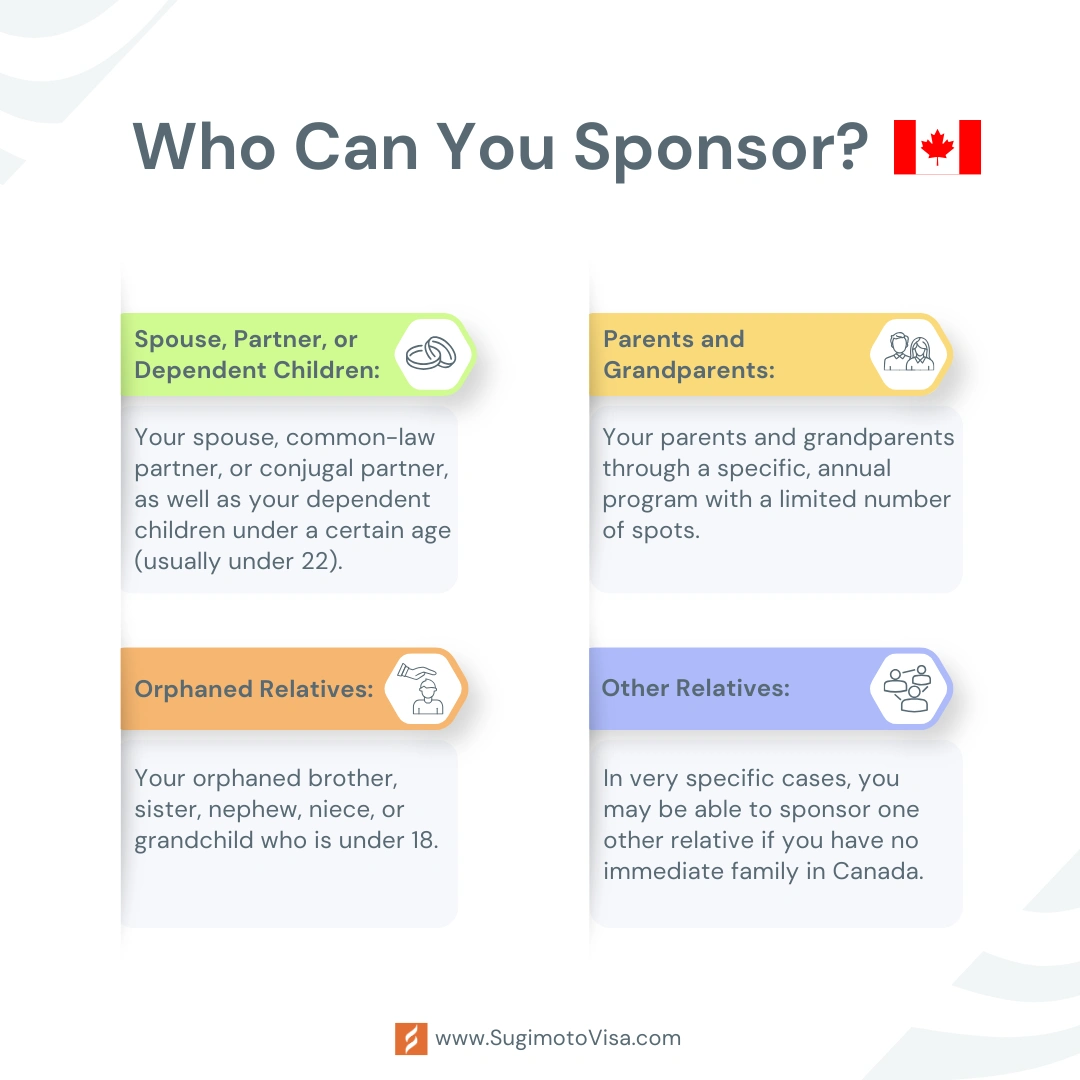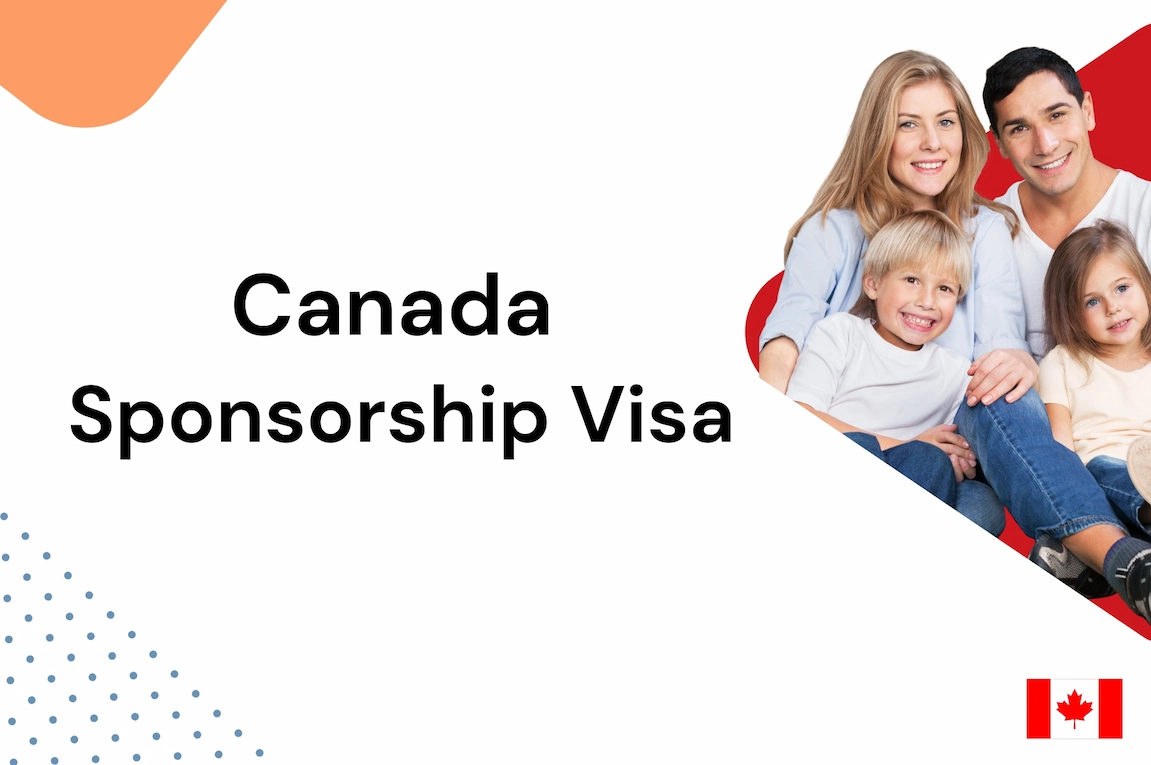The Canada Sponsorship Visa is an immigration program that allows Canadian citizens and permanent residents to sponsor close relatives, such as spouses, partners, children, parents, and grandparents, to become permanent residents and live with them in Canada.
Have you ever wondered about bringing your family to Canada? Maybe you’re a new permanent resident, or you’ve been a citizen for years, and your heart aches for your loved ones who are far away. Well, there’s a fantastic program in Canada called Family Sponsorship, and it’s designed to do just that: reunite families.
The immigration process can seem a bit scary, with lots of forms and legal words. But don’t worry. We’re here to walk you through it in a simple, friendly way. Think of this as your guide to bringing your family home.
So, let’s dive in and see how you can start this incredible journey.
| Sponsorship Stream | Eligibility Highlights | Key Documents |
|---|---|---|
| Spouse, Partner, or Children | - Sponsor: 18+, citizen/PR, and living in Canada. - Sponsored: Genuine relationship; dependent children under 22. | - Proof of relationship (photos, certificates) - ID documents (passport, birth certificate) - Medical exam results |
| Parents and Grandparents | - Sponsor: 18+, citizen/PR, and living in Canada. - Must meet a specific minimum income requirement. | - Proof of income (tax documents for 3 years) - Proof of relationship (birth certificate) - Medical exam and police certificates |
| Other Relatives | - Sponsor: 18+, citizen/PR, and no immediate family they could sponsor in Canada. | - Proof of relationship (e.g., adoption papers) - ID documents - Police certificates and medical exam results |
What Is the Canada Sponsorship Visa, Exactly?
Think of the “Canada Sponsorship Visa” as a pathway, not a single visa. It’s an official immigration program designed to help Canadian citizens and permanent residents reunite with their close family members.
Essentially, it’s a two-part process:
- You become a sponsor: As a Canadian citizen or permanent resident, you apply to sponsor your loved one. This is your way of promising the government that you will provide for them financially and support them as they settle into their new life in Canada.
- They get permanent residency: Once your sponsorship is approved, your family member receives a permanent resident visa. This is not a temporary visit. It allows them to live, work, and study in Canada for as long as they want, and gives them access to many of the same benefits as citizens, like healthcare.
In short, this program is Canada’s way of showing its commitment to a core value: keeping families together.

Who Can You Sponsor?
When it comes to family sponsorship, the first big question is, “Who can I sponsor?” The good news is, Canada’s program covers some of your closest family members. Let’s take a look.
- Your Partner (Spouse, Partner)
- Spouse: If you are legally married to your partner, you can sponsor them. It’s that simple.
- Common-Law Partner: If you’ve been living with your partner in a marriage-like relationship for at least 12 months, you can sponsor them, too.
- Conjugal Partner: This is for couples who are committed but can’t live together or marry because of reasons out of their control. Think about things like immigration rules or other serious barriers.
- Your Children
- You can sponsor your children who are considered “dependent.” Generally, this means they are under 22 and don’t have a spouse or partner.
- What if a child is older than 22? No problem, they can still be sponsored if they’ve depended on their parents for financial support since before they turned 22 due to a mental or physical condition.
- Your Parents and Grandparents
- Canada has a special program just for them. It’s called the Parents and Grandparents Program (PGP).
- This program is very popular, so there are a limited number of spots each year.
- Important: This program works a little differently. You must be invited to apply, and there are income requirements for this one.
- Other Relatives (In Specific Situations)
- Sometimes, you can sponsor other family members, like an orphaned brother, sister, nephew, niece, or grandchild.
- There’s also a special rule if you don’t have a spouse, partner, child, parent, or grandparent you could sponsor in Canada. In that case, you might be able to sponsor one other relative.
- Super Visa: The Super Visa allows parents and grandparents to visit Canada for extended periods of time.
Are You Eligible to Sponsor?
Sponsoring a family member is a big responsibility, so Canada has some rules to make sure you’re ready. Think of it as showing you’re committed to helping your loved one succeed here.
- Age and Status: You need to be at least 18 years old. Also, you must be a Canadian citizen, a permanent resident, or a registered Indian in Canada.
- Living in Canada: Generally, you must be living in Canada. But there’s a little exception. If you are a Canadian citizen living abroad, you can still sponsor your spouse, partner, or dependent child. You’ll just have to prove that you plan to move back to Canada once you become a permanent resident.
- Showing You’re Ready: You will need to sign a legal promise called an “undertaking.” This means you agree to provide for your family member’s basic needs. Things like food, clothes, and a place to live.
- How long is this promise? It depends on who you sponsor. For a spouse or partner, it’s usually three years. For your parents or grandparents, it’s 20 years. This shows Canada you are serious about helping your family.
You’ve got a huge heart to want to do this. The next step is getting everything ready.
The Family Sponsorship Application Process (Your Step-by-Step Guide)
Okay, you’ve checked that you and your family member are eligible. Now, what’s next? The process can seem like a lot, but if you take it one step at a time, it’s completely manageable. Let’s break it down.
- Get Your Documents in Order. This is super important. You’ll need to gather everything to prove your relationship, like a marriage certificate, birth certificate, or even photos and messages between you and your family member. You’ll also need to prove your own status in Canada.
- Pay the Fees. There are a few different fees, including a processing fee. You’ll need to pay them when you submit your application.
- Submit the Application. You’ll send in a full package that includes both your part (the sponsor) and your family member’s part (the person being sponsored).
- Wait for an Update. After you apply, Immigration, Refugees and Citizenship Canada (IRCC) will review everything. They might ask for more information or a medical exam for your family member. It’s so exciting to get that message, so be sure to check your account.
- The Final Decision. If all goes well, your family member will be approved. It’s a day of celebration, and they will receive their permanent residency.
Conclusion
This journey may seem long, but every step brings you closer to being with your family again. Canada’s family sponsorship program is a beautiful way to build a life together, creating new memories in a new home.
Remember, the goal is worth it. Don’t be afraid to take that first step. Whether it’s gathering a document or filling out a form, you’re making progress. You’ve got this. Your family is waiting, and Canada is ready to welcome them.
FAQs
Processing times can change. They depend on the type of sponsorship and the person’s location. The most accurate information can be found on the official IRCC website.
It’s a legal promise you make. You promise to financially support your sponsored family member for a set amount of time. This helps make sure they have a good start in Canada without needing government help.
This is a good question. You can’t sponsor if you’ve declared bankruptcy. You also can’t have a criminal record for certain crimes. It’s best to check the official rules to be sure.
Sometimes. If your spouse or common-law partner is already in Canada, they may be able to get a temporary work permit. This lets them work while waiting for their permanent residence application to be processed.
Yes, usually. But if you are a Canadian citizen living abroad, you can still sponsor your spouse, partner, or dependent child. You just need to show that you will move back to Canada once they get your permanent resident status.


